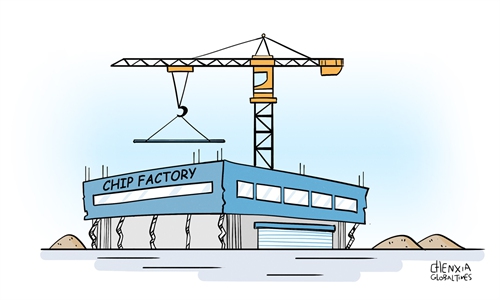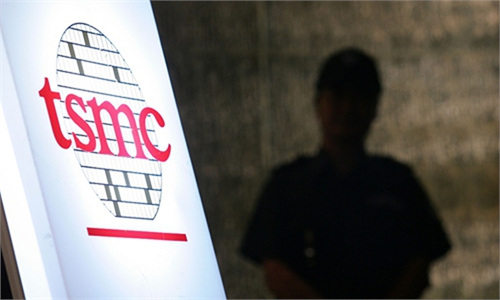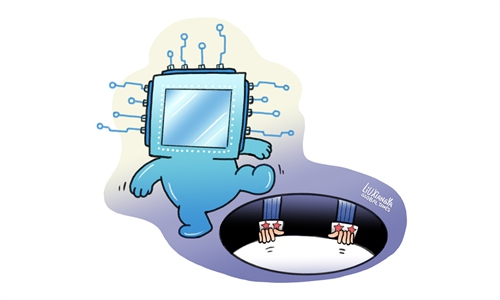
Illustration: Liu Xiangya/GT
It has long been America's desire to revitalize its semiconductor manufacturing capabilities, but it won't be an easy task. Even if Apple's A16 chips are manufactured on American soil at TSMC's Arizona facility, the breakthrough doesn't mean it will be all blue skies and smooth sailing for the redevelopment of the US semiconductor sector.Apple's A16 system-on-a-chip (SoC), which first debuted two years ago in the iPhone 14 Pro, is being manufactured at Phase 1 of TSMC's Fab 21 in Arizona in "small, but significant, numbers," former Bloomberg reporter Tim Culpan wrote on Substack, citing anonymous sources.
This news has not been confirmed, but it has been widely shared online. That's because, other than news reports, many people don't have other sources to learn about TSMC's operations in the US.
Over the past few months there have been a growing number of reports claiming that TSMC has encountered difficulties and setbacks in its overseas investment in the US. The New York Times published an article in August with the headline "What Works in Taiwan Doesn't Always in Arizona, a Chipmaking Giant Learns."
In recent interviews, 12 TSMC employees, including executives, said culture clashes between managers in Taiwan and workers in Arizona had led to frustration on both sides, according to the New York Times. TSMC is known for its rigorous working conditions. It's not uncommon for TSMC's workers to be called into work for emergencies in the middle of the night, but in Phoenix, some American employees quit after disagreements over expectations boiled over, the report said.
Cultural differences in the workplace are just one of the multiple challenges TSMC faces in the US. As a result, TSMC has pushed back the timeline for its Arizona chip factory. As the company steps up its global expansion, it said in 2023 that production at its first plant in Arizona would be delayed from a scheduled timeline of late 2024 to 2025, according to media reports.
Some observers guessed that the reported production of Apple's A16 SoC at TSMC's Fab 21 in Arizona was largely a test for the facility, and more production could be expected in the coming months. This means uncertainties remain on the road to mass production.
What surprised Culpan was that Apple's A16 SoC is being manufactured in the US. It means "they went for the most-advanced chip they could manage on US soil, in terms of both technology and volume, which shows Apple and TSMC want to start big," Culpan wrote.
The progress Culpan reported is not inconsistent with the challenges and setbacks TSMC has faced in the US, and they, together, reflect the complexity and multifaceted nature of US semiconductor supply chains.
On the one hand, Washington induces or even coerces some companies to increase high-end chip production capacity in the US. In this process, American politicians gain political capital to boast of the so-called revitalization of the US semiconductor industry.
On the other hand, those chip producers need to deal with various challenges, including but not limited to cultural differences, labor shortages, high manufacturing costs and uncertain profit margins.
If these difficulties cannot be completely resolved, or, in other words, the US cannot improve its business climate and business culture to adapt to the development of high-end manufacturing industries such as semiconductors, it will be difficult to truly revitalize its chip industry.
The path to restoring a robust manufacturing sector in the US includes arduous efforts. If the US can stop the chip war, stop disrupting the global semiconductor supply chain, and focus more on improving its business environment and solving the challenges faced by multinational companies, these efforts will truly help the development of the US semiconductor industry.
The author is a reporter with the Global Times. bizopinion@globaltimes.com.cn



